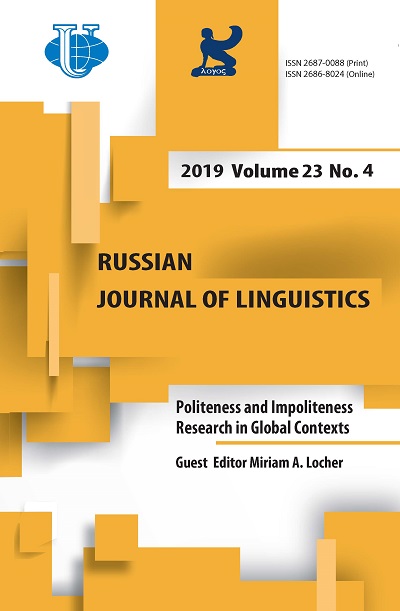Vol 23, No 4 (2019): Politeness and Impoliteness Research in Global Contexts
- Year: 2019
- Articles: 13
- URL: https://journals.rudn.ru/linguistics/issue/view/1270
- DOI: https://doi.org/10.22363/2687-0088-2019-23-4
Full Issue
Articles
Introduction to Politeness and Impoliteness Research in Global Contexts
Abstract
 873-903
873-903


Indexical and Sequential Properties of Criticisms in Initial Interactions: Implications for Examining (Im) Politeness across Cultures
Abstract
 904-929
904-929


Indirectness in the Age of Globalization: A Social Network Analysis
Abstract
 930-949
930-949


Politeness Pressure on Grammar: The Case of First and Second Person Pronouns and Address Terms in Korean
Abstract
 950-974
950-974


“Pedagogical” Agression in Russian Everyday Communication
Abstract
 975-993
975-993


Formal and Informal Russian Invitation: Context and Politeness Strategies
Abstract
 994-1013
994-1013


Understandings of Impoliteness in the Greek Context
Abstract
Interest in non-academic ways of understanding of im/politeness has so far been evident primarily in analyses of the sequential development of real-life interactions. However, understandings of im/politeness can be found in other sources such as related articles in on-line newspapers and their ensuing comments. The main aim of this paper is to contribute to this rather neglected area in im/politeness research, thus placing emphasis on the underexplored societal rather than individual level of im/politeness. The data to be investigated comes from two on-line articles and the comments they received. The articles appeared in a popular Greek free press on-line newspaper, LIFO, in 2014 and 2017 and were written by the same journalist. Both articles and ensuing comments express lay understandings of impoliteness and are discussed in the paper in terms of van Dijk’s (1998, 2006a, b) ideological discourse analysis and ‘ideological square’ that revolves around positive self-presentation and negative other-presentation. In exploring understandings of impoliteness in this context, we identified two emerging social identities, those of ‘polite’ and ‘impolite citizen’, dynamically co-constructed as binary opposites by the journalist and posters involved. Despite the fact that on-line newspaper articles and their accompanying comments reflect stereotypical thinking, they also depict pervasive views and are worth exploring because they concern the societal level of im/politeness.
 1014-1038
1014-1038


Divine impoliteness: How Arabs negotiate Islamic moral order on Twitter
Abstract
 1039-1064
1039-1064


Disagreement and (im)politeness in a Spanish family members’ WhatsApp group
Abstract
 1065-1087
1065-1087


Relational Work in Airbnb reviews
Abstract
Peer-to-peer businesses such as Airbnb have recently given rise to new travel trends in which electronic word of mouth, in the form of online consumer reviews (OCRs, henceforth), is the main trust mechanism with a threefold purpose: to make informed decisions regarding accommodation, gain good reputation, and manage the relational component as continuity from the offline stage of the experience. In the light of the above, this study will analyse 120 reviews (60 positive and 60 negative) written by Airbnb travellers and linked to three different emotional orientations: delighted/satisfied, ambivalent/neutral, and dissatisfied/disappointed. Taking an illocutionary and stylistic domain perspective, the reviews will be examined to understand how users manage relational work (Watts 1989, Locher and Watts 2005, Locher 2006, Locher and Watts 2008), and to ascertain what is likely to be the ‘norm’ in this particular genre (i.e., OCRs) and for the particular Virtual Community of Practice (VCoP, henceforth) (i.e., guests and hosts interacting in Airbnb). The results show that being polite seems to be the norm (hence being politic), while being rude or offensive is the exception. The data also suggest that users tend to be politic/polite through very enthusiastic and friendly messages, while dissatisfaction and ambivalence are shown by means of a process of depersonalisation, with a tone based on formality and distancing from the host. Information is also obtained from what is not said, which creates the implicature of dissatisfaction. This seems to be implicitly understood by the members of this VCoP, who seem to perceive sociability as pivotal to assess their experience.
 1088-1108
1088-1108


BOOK REVIEW
Review of Mills, Sara. (2017). English Politeness and Class. Cambridge: Cambridge University Press. ISBN 9781316336922
 1109-1114
1109-1114


Review of Locher, Miriam A. (2017) Reflective Writing in Medical Practice: A Linguistic Perspective, Bristol: Multilingual Matters. ISBN: 978-78309-823-1
 1115-1121
1115-1121


CONFERENCES
The 12th International Conference on (Im)Politeness (Cambridge, Anglia Ruskin University 17-19 July, 2019): A Report
 1122-1127
1122-1127
















